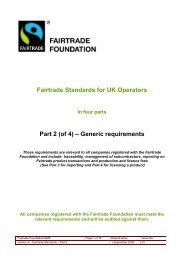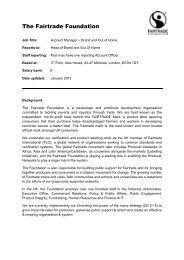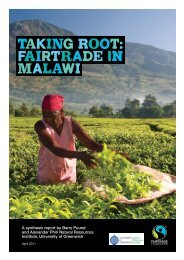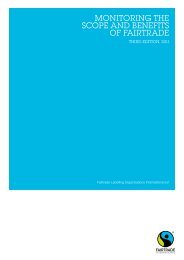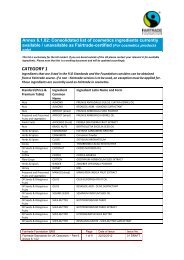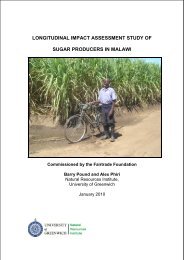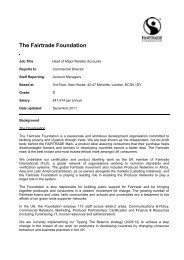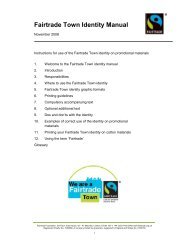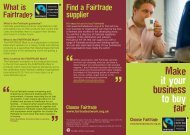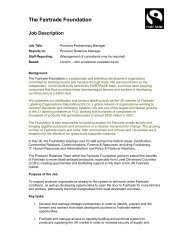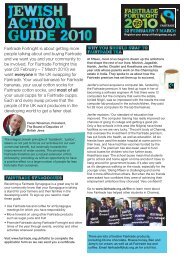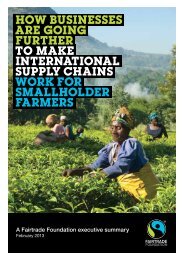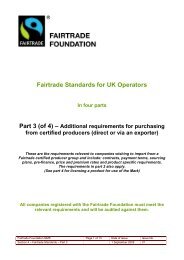the great cotton stitch-Up - The Fairtrade Foundation
the great cotton stitch-Up - The Fairtrade Foundation
the great cotton stitch-Up - The Fairtrade Foundation
Create successful ePaper yourself
Turn your PDF publications into a flip-book with our unique Google optimized e-Paper software.
contents<br />
Foreword ............................................................................................... 3<br />
Executive summary ............................................................................... 4<br />
West Africa: <strong>stitch</strong>ed up ......................................................................... 8<br />
Mali case study .....................................................................................16<br />
Cotton USA: ano<strong>the</strong>r world ...................................................................18<br />
<strong>The</strong> EU: <strong>the</strong> highest subsidiser of <strong>cotton</strong> in <strong>the</strong> world .............................22<br />
Emerging economies: fighting rural poverty .........................................24<br />
David v Goliath: how <strong>the</strong> West African Cotton-4 forced<br />
<strong>the</strong> WTO to <strong>the</strong> table but is still waiting to be served ............................26<br />
Recommendations ................................................................................33<br />
Five years of <strong>Fairtrade</strong> <strong>cotton</strong> ...............................................................34<br />
References ............................................................................................38<br />
Glossary ................................................................................................39<br />
Abbreviations <strong>Fairtrade</strong> plays a crucially important role in reminding<br />
us of <strong>the</strong> ethical dimension of trade, trying to ensure<br />
C-4: <strong>The</strong> four <strong>cotton</strong> producing<br />
countries of Benin, Burkina Faso,<br />
Chad and Mali<br />
CAP: <strong>The</strong> European Union’s Common<br />
Agricultural Policy<br />
CFA Franc: Communauté Financière Africaine<br />
(African Financial Community)<br />
Franc, currency used in West and<br />
Central Africa<br />
CP: Countercyclical Payment<br />
DDR: Doha Development Round<br />
FLO: <strong>Fairtrade</strong> Labelling Organizations<br />
International<br />
ICAC: International Cotton Advisory Council<br />
NCC: National Cotton Council of America<br />
OECD: Organisation for Economic Cooperation<br />
and Development<br />
PPP: Purchasing Power Parity<br />
USDA: United States Department of<br />
Agriculture<br />
WTO: World Trade Organisation<br />
ACkNowlEDgements<br />
<strong>The</strong> <strong>Fairtrade</strong> <strong>Foundation</strong> would like to thank Alexandra Cacciatore, Jayanti Durai, Nicolas Imboden,<br />
Nick Mathiason, Mobiom, Anne-Sophie Nivet, Ousmane Samake, Aurelie Walker and <strong>the</strong> many <strong>cotton</strong><br />
producers interviewed for <strong>the</strong>ir contribution to this report.<br />
Photography credits: Trevor Leighton, Simon Rawles, Peter Caton<br />
Designed by Kate Fishpool<br />
In partnership with:<br />
With <strong>the</strong> generous support of:<br />
that trade genuinely benefits those, especially <strong>the</strong><br />
world’s poorest people, who participate in it.<br />
Cotton is at <strong>the</strong> heart of agricultural and economic<br />
development in many African countries. It makes a<br />
vital contribution to foreign exchange earnings and<br />
accounts for a significant proportion of GDP and<br />
tax income.<br />
Take Mali. Since independence in 1960, Mali has<br />
suffered droughts, rebellions, a coup and 23 years of<br />
military dictatorship. But since its first democratically<br />
elected president took power in 1992, it has had a<br />
civilian government and enjoyed relative political<br />
stability. It also produces <strong>cotton</strong>.<br />
At its peak in 2003/04 <strong>cotton</strong> production in Mali<br />
reached 620,000 tonnes. That involved three million<br />
people working on 160,000 farms and contributed 3%<br />
of GDP and 38% of export revenues.<br />
Yet <strong>the</strong> subsidies paid by governments in developed<br />
countries mean <strong>the</strong> real benefits of trade are not felt<br />
by farmers in developing countries. This report by<br />
<strong>the</strong> <strong>Fairtrade</strong> <strong>Foundation</strong> shows how, in <strong>the</strong> 10 years<br />
since <strong>the</strong> initiation of <strong>the</strong> Doha Development Round<br />
of world trade talks over $40bn has been allocated<br />
by major economies to supporting <strong>the</strong>ir own <strong>cotton</strong><br />
production. Direct losses to West Africa as a result<br />
of US and EU subsidies are estimated at $250m per<br />
annum, according to Oxfam. <strong>The</strong> system pits a typical<br />
Foreword<br />
Malian producer, farming two hectares of <strong>cotton</strong>, who<br />
is lucky to gross $400 a year, against US farms which<br />
receive a subsidy of $250 per hectare.<br />
Oxfam calculates that removing US <strong>cotton</strong> subsidies<br />
would boost average household income in West Africa<br />
by up to 9% – enough to feed a million people.<br />
<strong>The</strong> current system of subsidies cannot be right and<br />
certainly is not fair. <strong>The</strong> problem is being addressed<br />
through <strong>Fairtrade</strong>, which is a robust economic and<br />
business model. But ultimately, <strong>the</strong> aim must be to<br />
make all trade ‘Fair Trade’.<br />
<strong>The</strong> principles of <strong>Fairtrade</strong> need to be integrated and<br />
reflected in <strong>the</strong> global trading system, to ensure that<br />
poor producers receive a fair price and are enabled<br />
to take control of <strong>the</strong>ir own development.<br />
<strong>The</strong> UK Government is committed to working<br />
towards this aim.<br />
Rt Hon Dr Vince Cable MP<br />
UK Secretary of State for Business, Innovation and<br />
Skills and President of <strong>the</strong> Board of Trade<br />
2 <strong>The</strong> <strong>great</strong> <strong>cotton</strong> <strong>stitch</strong>-up<br />
This publication has been produced with <strong>the</strong> financial assistance of <strong>the</strong> European Union and SECO. Its contents are <strong>the</strong> sole responsibility of <strong>the</strong><br />
<strong>Fairtrade</strong> <strong>Foundation</strong> and can under no circumstances be regarded as reflecting <strong>the</strong> position of <strong>the</strong> European Union or SECO.<br />
<strong>The</strong> <strong>great</strong> <strong>cotton</strong> <strong>stitch</strong>-up 3



